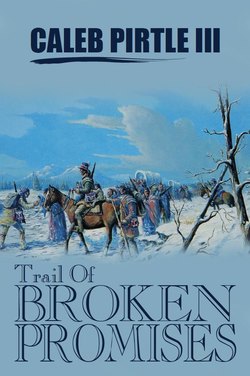Читать книгу Trail of Broken Promises - Caleb Pirtle III - Страница 6
На сайте Литреса книга снята с продажи.
Chapter 2: Out of the Fog
ОглавлениеFOR A LONG time, the ancient Creeks wandered lost and blind in a great fog that wrapped itself like a gray flannel shroud around the earth. At least, that was the legend, the genesis of the clans that ruled the timbered countryside of Alabama and Georgia.
It had been a time of darkness, of separation.
Families were torn apart, husbands from wives, parents from children. And they searched and they groped. They could not see and they were alone.
Fear haunted their footsteps as they stumbled on in confusion. Hands reaching out touched other hands, and they all held on. They had found someone, and they all needed someone. Groups were formed. And the animals, crying in the fog, too frightened to be wild anymore, followed after those who chanced to cross their frantic, forgotten path.
A wind rose up out of the east and chased the fog away. The first group to fall into the light became the Wind Clan, and the other bands held on to the names of the animals who walked the darkness with them. Away from the fog marched the Bear, Beaver, Bird, Deer, Alligator, Raccoon, and Tiger Clans.
All agreed they would forever be as “people of one flesh,” always together, never apart, forming the confederacy of the Creek nation.
From them came the White Towns, the harbingers of peace and good will, and the Red Towns, whose warriors never minded lifting the hatchet and did so every chance they got. They would gather in the chokofa, the town square, or perhaps in a forest, fast awhile, drink strong medicine, hang a few charms and sacred objects on themselves, then ride out hell bent for leather to raid the Choctaws to the west or the Cherokees to the north.
War was important to the Creeks. It was the only way they had to gain recognition, to win personal distinction within the tribe.
They sought scalps.
They sought glory.
They would chase down the men among their enemies and kill them without fear or compassion. But they always brought the women and children home to be adopted into the Creek nation.
The warriors also had a habit of annexing tribes that chose to surrender rather than die. That’s how the Alabamas, the Koasatis, the Hitchitees, and the Tuskegees wound up as Creeks in the first place.
Reluctantly, even the White Towns rode out to shed blood. They didn’t like it, but they never got a promotion without it.
The Creeks worked together in a large garden, the Chiefs right alongside the lesser members, joking and singing and raising beans, corn, squash, melons, and pumpkins. The Lower Towns, with a wetter climate, produced rise. Men worked or they were fined. They worked diligently or they were chased out of town.
That was law.
And when the fields gave out, the Creeks merely abandoned them and moved on, dragging their towns along behind them. The crops played a critical role in the tribe’s way of life, other than just keeping the hungry fed.
When a man chose a girl to be his wife, he promptly moved into her house. But the marriage wasn’t fully consummated until after the harvest of the corn, giving her a few more months to be friendly with as many men as she liked. Once that corn was in, however, she had to be faithful, or her husband’s clan would promptly cut off their hair, her ears, and sometimes her nose. And the woman’s lover wound up in much the same shape as she.
The man, alas, could take as many wives as he wanted, provided the other spouses consented, and they almost always did.
By the 1790s, the Creeks looked around and realized that white men were running rampant over their Georgian lands. As one state commissioner explained, “They [the Georgians] are like a river, so very full that its banks cannot contain it.”
He wanted to purchase a great chunk of ground between the Oconee and Ocmulgee rivers. He met with the Creeks and, with a reverent tone in his voice, appealed to their compassion. He said, “No red man would refuse a white man something to eat, if he came hungry to his cabin; and yet a refusal of this land will be like a denial of bread to many hungry families, who want to raise corn on it to feed themselves.”
The Creeks refused.
Their lands were their lives, too important to lose, sell, or give away.
The white men looked down in anger.
And they called the Creeks savage.
